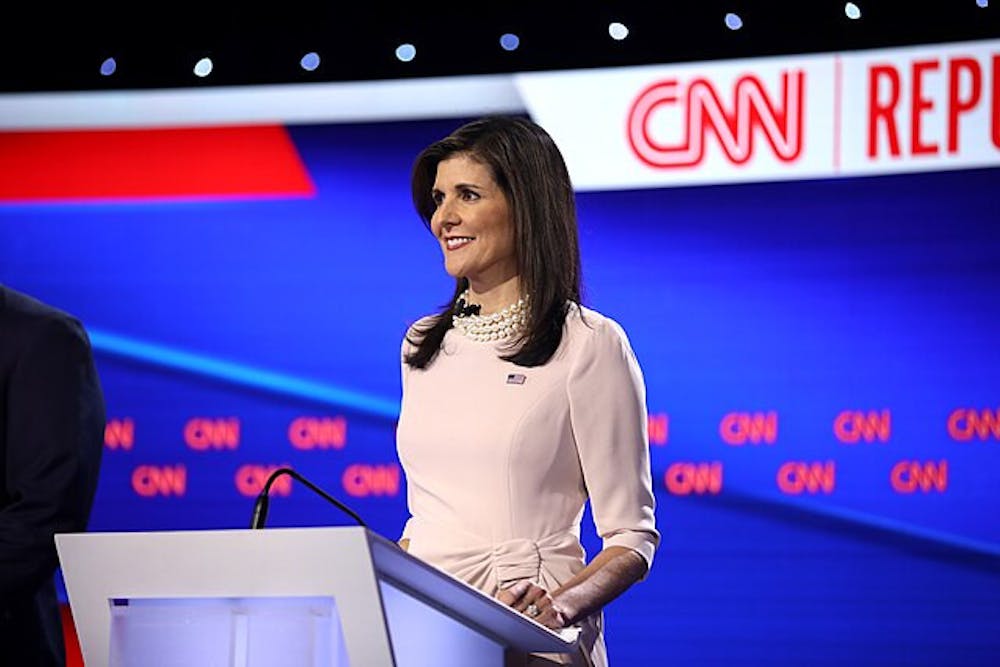As the Republican primary and caucus results are starting to come in, confirmation of former president Donald Trump’s long-expected candidacy for the 2024 Presidential Election is getting even more inevitable. So far, only the results from Iowa and New Hampshire are in; however, they strongly demonstrate that Trump’s only major rival, Nikki Haley, former U.S. ambassador to the United Nations, has a slim chance of prevailing in the primaries — unless she manages to attract Trump’s detractors successfully.
The Iowa caucus and New Hampshire primary officially kicked off the election cycle, and Trump came out as the winner from both of them, obtaining 51% and 54.3% of the votes, respectively.
When Trump first announced that he would be running for president in November 2022, his candidacy was received with enthusiasm by some loyal Trump advocates who believe in the Big Lie, yet he was mocked by others. I was one of them. As the only U.S. president who has managed to get impeached twice, a man in the middle of many criminal trials and a president who couldn’t achieve re-election, why is he running for president again? Could any Republican be blind enough to vote for such a man?
In my opinion, although people started to view Trump as a significant threat when he started to lead a more organized (and definitely more hostile) campaign, the results of the Iowa caucus are the most tangible proof of his dominance over other candidates. After Trump received more votes in Iowa than the sum of his two most critical opponents’ (Haley and Florida governor Ron DeSantis), DeSantis ended up suddenly suspending his campaign on Jan. 21.
Whether the results of the Iowa caucus accurately reflect the general opinion of the public or not is unclear. In my opinion, caucuses are far less democratic and inclusive than primaries. They are meetings where (generally) participants divide into groups according to who they support, then discuss current issues and why their candidate is the best fit for the presidency. They are not formal votes like primaries. They have complex rules and require excessive time commitment, which causes the underrepresentation of opinions by minorities (such as people with disabilities or shift workers).
We have seen how dangerously zealous Trump followers can be when it comes to supporting him. Major events like the Jan. 6 U.S. Capitol attack show that Trump supporters are willing to go to lengths that voters of other candidates, like Haley or DeSantis, wouldn’t. This is the main disadvantage they face(d) in their campaigns: They don’t have advocates enthusiastic to defend them and collect votes for them; rather, their supporters are “Never Trumpers” close to losing hope after Iowa and New Hampshire. In the eyes of the Republicans, the decision is not between different candidates. It is a choice between a future with or without Trump.
Despite the shortcomings of the caucus system, the results from the New Hampshire primary are proof that the Iowa caucus reflected the truth. It’s important to note that Trump’s share of the New Hampshire primary votes has decreased significantly from 2020, dropping from an impressive 85.7% to 54.3%. This was expected, as, in the 2020 primary cycle, he was the incumbent president. In contrast, it was going to be tough for him to win in New Hampshire this year, especially when Haley’s campaign seemed to be gaining ground.
On another note, the combined analysis of Iowa and New Hampshire reflects a division between the Republicans (not by which candidate they advocate for, but by whether they support Trump’s presidency or not). Trump, DeSantis, and Haley received 51.0%, 21.3% and 19.1% of the votes in Iowa, respectively, which shows a close 50-50 division of “Trump” or “No Trump.” When DeSantis dropped out of the race following these results, he announced that he would endorse Trump and even called Haley a representative of “warmed-over corporatism.”
One would expect DeSantis’ supporters to abide by what he says and endorse Trump, too. New Hampshire was proof that this wasn’t the case, as Trump’s vote increased by little to 54.3%, yet Haley’s votes were more than double her Iowa percentage, 43.3%. This increase in Haley’s votes, yet the preservation of the aforementioned 50-50 situation, shows that it is possible that former DeSantis supporters were inclined to vote for Haley over Trump as an “Anyone but Trump” move.
The next primary on the election calendar for the Republicans, following the caucuses in Nevada and the Virgin Islands, is the South Carolina primary, which will determine the future of Haley’s campaign, as it is her home state. Will the voters who chose her to be their governor in 2014 vote for her as the Republican Presidential nominee in 2024? South Carolina was one of the many states that had their primaries canceled in 2020, as the Republican Party reported Trump had a good record as President, and it is an even more conservative state than New Hampshire. Due to this reason, I don’t think Haley will come out victorious from her state, and I predict that Haley will suspend her campaign after losing. She might have promised to keep her campaign going until at least Super Tuesday, but DeSantis also vowed to stay in and look where he is now.
Haley’s only shot at being the Republican presidential candidate is by attracting voters who are angry with Trump and positioning herself to be a better alternative. She’s doing so by trying to prove her conservativeness, such as by mentioning her past as a Tea Party governor. This might work in some states, and it may have helped her increase her votes in New Hampshire, but the question remains: Will it be enough for her to attract the majority of Republicans? Personally, I don’t think it will be.
Buse Koldas is a freshman majoring in Chemical & Biomolecular Engineering and Computer Science from Istanbul, Turkey.





